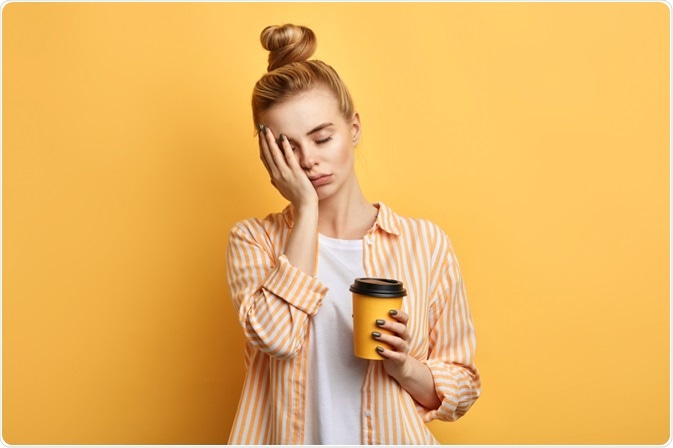Hypersomnia, also known as hypersomnolence, refers to a condition of excessive sleepiness, which inhibits the ability of an individual to participate in everyday activities as normal. The symptoms most commonly present during adolescence or early adulthood, although an individual can develop symptoms of hypersomnia at any age.

Image Credit: The Faces / Shutterstock.com
Symptoms
The defining symptom of hypersomnia is excessive sleepiness during the day, which makes it difficult for individuals to stay awake and compels them to take frequent naps that provide little relief. Patients typically sleep for more than 10 hours each night but continue to have difficulty waking up and feel drowsy and confused in the morning.
The frequent daytime napping can disrupt everyday activities and can even be dangerous in some instances, such as when the individual is driving. The naps can also interfere with social commitments, performance at work, or in completing studies. The drowsiness caused by this condition can affect energy levels and have a negative effect on memory and cognition.
As a result, many patients develop secondary symptoms that are related to mental health, such as anxiety or depression.
Causes
Hypersomnia can present as a result of various underlying health conditions and other causes, including:
- Narcolepsy
- Sleep apnea
- Restless legs syndrome
- Sleep deprivation
- Depression
- Tranquilizer medication use
- Drug or alcohol misuse
Idiopathic or primary hypersomnia refers to symptoms of excessive sleepiness without an underlying cause and despite getting adequate sleep at nighttime.
What is hypersomnia?
Diagnosis
When an individual presents with symptoms that may be indicative of hypersomnia, it is useful to gather information about their sleeping habits to aid diagnosis.
A sleep diary is a useful tool for both the patient and health practitioner to record information about sleeping habits. This may include information about the duration and quality of sleep at night, as well as the frequency of naps or the desire to nap during the day.
There are also a number of tests that can be carried out with the help of a sleep specialist to investigate the cause and characteristics of the condition. These include polysomnography or a multiple sleep latency test.
Polysomnography, for example, is a nighttime sleep test that monitors the sleep patterns of an individual over the course of an entire night. This is useful in the differential diagnosis to rule out other conditions, such as narcolepsy or sleep apnea.
Comparatively, a multiple sleep latency test monitors the time required for the patient to fall asleep and stay sleeping when asked to take several naps throughout the day. A patient with hypersomnia can readily fall asleep during the day, usually in less than eight minutes.
Idiopathic hypersomnia is distinct from narcolepsy, as it is not associated with loss of muscle control with strong emotions or vivid dreams and hallucinations. Additionally, daytime naps do not provide any lasting relief from symptoms.
Management
Adequate management of hypersomnia is essential to reduce the symptoms of the condition and increase the quality of life of the individual.
As most individuals with hypersomnia have good sleeping habits and get adequate sleep at night, lifestyle changes to improve symptoms are not usually effective. Nonetheless, patients should make sure to avoid consuming caffeine, alcohol, or nicotine close to bedtime and maintain a regular sleep schedule.
If hypersomnia symptoms present secondary to an underlying cause or health condition, this should be managed first. For example, antidepressants can help to manage emotional or psychological problems that may interfere with sleep. In some cases, this provides effective relief alone, although further techniques may be required.
While there are no medications targeted for the treatment of idiopathic hypersomnia, several medications used in the management of other sleeping disorders, such as narcolepsy, can be effective. To this end, stimulant medications such as modafinil, dexamphetamine, and methylphenidate can help to increase alertness and reduce drowsiness during the day. Flumazenil is an emerging treatment for hypersomnia, although further research in this area is required.
References
Further Reading
Last Updated: Nov 8, 2022